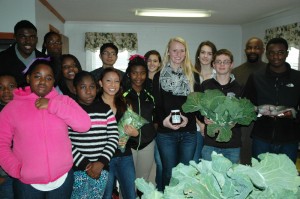 It’s hard for many people to believe that there are still many parts of the US that don’t have access to fresh and nutritious food. Conetoe, North Carolina, is one of these many “food deserts”. The small town is located an hour east of Raleigh and the nearest grocery store is at least 10 miles from the predominantly African American community of about 300.
It’s hard for many people to believe that there are still many parts of the US that don’t have access to fresh and nutritious food. Conetoe, North Carolina, is one of these many “food deserts”. The small town is located an hour east of Raleigh and the nearest grocery store is at least 10 miles from the predominantly African American community of about 300.
Over a decade ago, this community was paying a heavy price for poor nutrition. “I watched many of my parishioners die from diseases that were easily preventable,“ recalls Reverend Richard Joyner, a pastor at a local church. “Diabetes, high blood pressure and other life style related diseases were common. In one year, we counted 30 funerals. I couldn’t ignore it anymore. I was spending more time performing funerals than anything else in the community.”
Planting the seed
Joyner narrowed down the problem to the lack of fresh nourishing food in the community. He, therefore, started a garden to make this resource available to the community and enlisted the help of the local children. He founded a nonprofit, Conetoe Family Life Center, in 2007 to manage the project. The nonprofit now has over 20 plots of land under its management including a 25-acre site.
Joyner is assisted by more than 80 children and teens. The young people help with the planting and harvesting year round. The nonprofit has produced about 50,000 pounds of fresh produce annually. Some of the produce is donated to the local residents who can’t afford it and the rest is sold by the students.
More than just food
“Our goal is to change the cycle of poverty affecting families in the community by improving the resources that the families have available to them,” says Joyner. “We are especially targeting the children. We aim to change the children in the community through education and creating opportunity and, therefore, change the families.”
The youth learn social skills through their experience with the program. They learn how to relate with each other and develop healthy relationships. They also get to practice skills such as math and science as they figure out how to market and sell their produce.
“When you give youth the chance, they think outside the box,” says Joyner. The program seeks to create a safe space for the young people where they can seek answers to problems for themselves. “They came up with the beekeeping idea themselves,” recalls Joyner. “I was against it but was outvoted. They went for the training and 12 are now certified beekeepers.” The program now has more than 150 beehives that produce over 5,000 pounds of honey annually.
